-
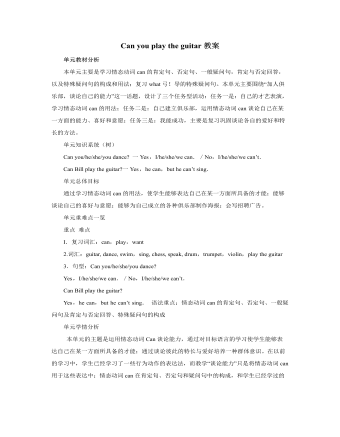
人教版新目标初中英语七年级上册Can you play the guitar教案
本单元主要是学习情态动词can的肯定句、否定句、一般疑问句,肯定与否定回答,以及特殊疑问句的构成和用法;复习what弓!导的特殊疑问句。本单元主要围绕“加人俱乐部,谈论自己的能力”这一话题,设计了三个任务型活动:任务一是:自己的才艺表演,学习情态动词can的用法;任务二是:自己建立俱乐部,运用情态动词can谈论自己在某一方面的能力、喜好和意愿;任务三是:我能成功,主要是复习巩固谈论各自的爱好和特长的方法。单元知识系统(树)Can you/he/she/you dance? 一Yes,I/he/she/we can./No,I/he/she/we can’t.Can Bill play the guitar?一Yes,he can,but he can’t sing.单元总体目标通过学习情态动词can的用法,使学生能够表达自己在某一方面所具备的才能;能够谈论自己的喜好与意愿;能够为自己成立的各种俱乐部制作海报;会写招聘广告。单元重难点一览重点 难点I.复习词汇:can,play,want2.词汇:guitar, dance, swim,sing, chess, speak, drum,trumpet,violin,play the guitar3.句型:Can you/he/she/you dance?Yes,I/he/she/we can./No,I/he/she/we can’t.Can Bill play the guitar?

人教版新目标初中英语七年级上册How much are these pants教案
个性练习设计 阅读广告:在日常生活中,人们去买东西之前,一般要阅读广告,从广告中获取该商品的一些有用信息,包括价格、性能等。所以给学生提供有些商品的广告或让学生去商店去阅读一些商品的广告,从中获取商品的价格,即可以锻炼学生的阅读能力,又能提高实践能力。 Self Check 教学内容 Self Check(教材P42) 教学目标 知识与能力 复习词汇pant,sock,T-shirt,sweater,shoes,color,black,white,red,green,blue,big,short,long,数字10--31; 学习词汇Zig Zag,clothes,shop,yellow,ask,which;学会谈论服装的价格、颜色、大小和长短;学会填写价格标签。 过程与方法 运用Summarizing和Classifying的学习策略。在复习教学中,运用听写、绘画、互相询问调查与检测等手段,促使学生不断地使用所学内容,从而提高他们灵活运用知识的能力。 情感态度价值观 该部分学习内容主要是复习谈论服装的价格和颜色以及对服装的喜好,能引起学生的共鸣;通过购物的对话练习教学生学会购物时使用的礼貌用语和如何感谢人。
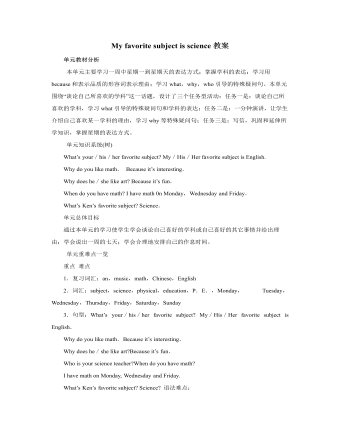
人教版新目标初中英语七年级上册My favorite subject is science教案
本单元主要学习一周中星期一到星期天的表达方式;掌握学科的表达;学习用because和表示品质的形容词表示理由;学习what,why,who引导的特殊疑问句。本单元围绕“谈论自己所喜欢的学科”这一话题,设计了三个任务型活动:任务一是:谈论自己所喜欢的学科,学习what引导的特殊疑问句和学科的表达;任务二是:一分钟演讲,让学生介绍自己喜欢某一学科的理由,学习why等特殊疑问句;任务三是:写信,巩固和延伸所学知识,掌握星期的表达方式。单元知识系统(树)What’s your/his/her favorite subject? My/His/Her favorite subject is English.Why do you like math. Because it’s interesting.Why does he/she like art? Because it’s fun.When do you have math? I have math 0n Monday,Wednesday and Friday.What’s Ken’s favorite subject? Science.单元总体目标通过本单元的学习使学生学会谈论自己喜好的学科或自己喜好的其它事情并给出理由;学会说出一周的七天;学会合理地安排自己的作息时间。

人教版新目标初中英语七年级下册How was your weekend教案2篇
Teaching Goal:1. General aims:Talk about recent past events2. Particular aims:A. Language Focus.Talk about recent past events and think of the past events.B. Language goalsHow was….?It was …What did …do over the weekend?C. Language structures:(1). How was your weekend? I was great. Pay attention to no form.(2). What did you do over the weekend? I played soccer. We went to the beach.D. Useful words and phrases:Words: was, did, went, beach, over, project, test, wasn’t, false, number, geography, spend, week, most, mixture, their, had, little, cook, read, saw, change, everyone, sit, sat, no, anythingPhrases: did one’s homework, played soccer, cleaned my room, went to the beach, played tennis, went to the movies, on Saturday morning, over the weekend, cook … for, what about, do some reading, have a party, talk show, go shoppingE. Grammar language:Present simple past tenseRegular and irregular verbsF. Learning strategies:Tour and holidaysG. Interdiscipinary:H. Emotion and manner:Teaching time: 5 periodsTeaching procedures:Period One教学步骤、时间 教师活动 学生活动 媒体应用Step 1Free talk 3’ Ask some questions like:Who’s on duty today?What’s the weather like? Answer and talk about something.让同学们回答下列问题1. Do you like weekend? (Let some students answer)It takes them three minutes to talk about the question.2. Why do you like weekend? (let the students answer) Most of the students like the weekend此时教师用汉语问:“在周末期间问你干了什么?这句话用英语这么回答?Let the students guess.At last the teacher give them right answer3. What did you do over the weekend?(板书、学习)
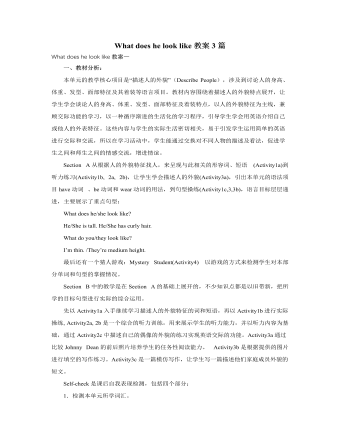
人教版新目标初中英语七年级下册What does he look like教案3篇
所需要用到的句子:Who is that?That is Jack. I like him.Why do you like him?I like him because he is interesting.Task 4: 设计理想中的人类Step one: 设计理想中的人类的外貌。把全班同学分成若干小组,学生可以边说边在纸上画出他们的模样。Step two: 设计理想中人类的性格。学生们可以把那些能描述性格的单词写在图画的旁边。Step three: 每组选出一名同学,其他同组同学提问,他作简单回答,并说明原因。所需用到的句子:What does he or she look like?He or she ...What is he or she like?He or she is ...Why?Because ...Task 5: 挑战性活动调查性格是天生的还是后天形成的,让每个同学回家去调查一下自己成长过程中性格是否有变化,具体是怎样的,为什么会这样? Teaching Aims:1. Enable students to have a general understanding of how to talk about people's physical appearance.2. Enable students to tackle some essential vocabularies and patterns about describing people. Provide them with necessary skills and methods.3. Create various chances for students to describe the persons they're familiar with, such as classmates, family members, teachers, idols, etc.

人教版新目标初中英语七年级下册Where is the post office教案2篇
Period 2 (3a----Section B 2c)Preview(Pre-task): Key points: What laAdd another information about their pen pals----their language on the cardnguage does she/he speak?She/He speaks....Does she/he have any brothers and sisters? Does she/he speak English?Preview(Pre-task): Add another information about their pen pals----their language on the cardKey points: What language does she/he speak?She/He speaks....Does she/he have any brothers and sisters? Does she/he speak English?Step 1 Revision1.Revisionand dictation of the new words 2.Revise the drills they learned yesterday.(by pairwork and grammar exercise)Step 2 Leading-inT has a conversation with one student. The conversation is following:---Do you have a pen pal?---Yes, I do.---What's your pen pal's name? ---His/Her name is....---Where is your pen pal from? ---He/She is from...---Where does he/she live? ---He/She lives in....---What language does he/she speak?He/She speaks...Write the new words on the Bb. They are following: EnglishChineseJapaneseFrenchStep 3 LearnLearn the new words with the whole class.Finish 3a with the students3b Pairwork T still does an example with one student Then the Ss practise in pairs. The example is following:--Curry Muray is my pen pal. He is from the United States.---What language does he speak?
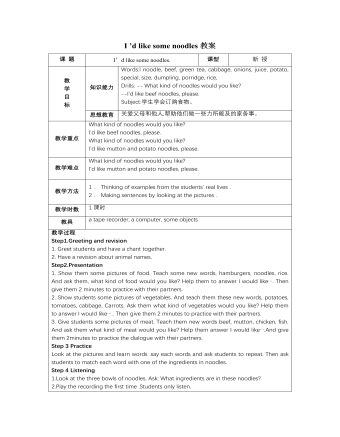
人教版新目标初中英语七年级下册I ’d like some noodles教案
教学过程Step 1: warming-up Sing a song---------“food and drink” Step 2: Revision1 Dictation2 Revise: What kind of noodles would you like?I’d like …What size bowl of noodles would you like?I’d like…Step 3: Presentation1 show pictures of food, ask students say the words.2 Students read the newspaper ad in 3a. Fill in blanks with words in the box. Then read the ad together, the teacher explains some difficult language points.3 Check the answers Step 4 PracticeAsk students to finish 3b in the same way according to 3a. Students read the short passage and fill in the blanks .At last, check the answers.Step 5 productionAsk students to write their own ad for dumplings, noodles, drinks, and other foods they know. Then ask students to read their partner’s ad. Then order food and drink from their partner.Step 6 Home workGroup work – make an ad about “food and drink”
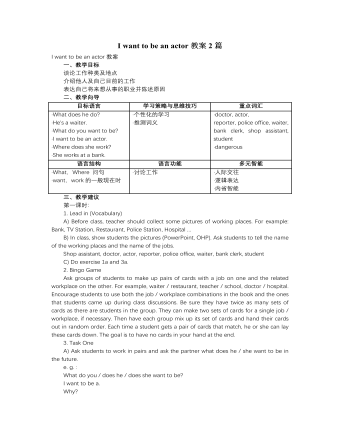
人教版新目标初中英语七年级下册I want to be an actor教案2篇
三、教学建议第一课时:1. Lead in (Vocabulary)A) Before class, teacher should collect some pictures of working places. For example: Bank, TV Station, Restaurant, Police Station, Hospital ...B) In class, show students the pictures (PowerPoint, OHP). Ask students to tell the name of the working places and the name of the jobs.Shop assistant, doctor, actor, reporter, police office, waiter, bank clerk, studentC) Do exercise 1a and 3a.2. Bingo GameAsk groups of students to make up pairs of cards with a job on one and the related workplace on the other. For example, waiter / restaurant, teacher / school, doctor / hospital. Encourage students to use both the job / workplace combinations in the book and the ones that students came up during class discussions. Be sure they have twice as many sets of cards as there are students in the group. They can make two sets of cards for a single job / workplace, if necessary. Then have each group mix up its set of cards and hand their cards out in random order. Each time a student gets a pair of cards that match, he or she can lay these cards down. The goal is to have no cards in your hand at the end.3. Task OneA) Ask students to work in pairs and ask the partner what does he / she want to be in the future.e. g. :What do you / does he / does she want to be?I want to be a.Why?Because it's (adj).B) Vocabulary: Section B, 1a4. Homework 1.2.
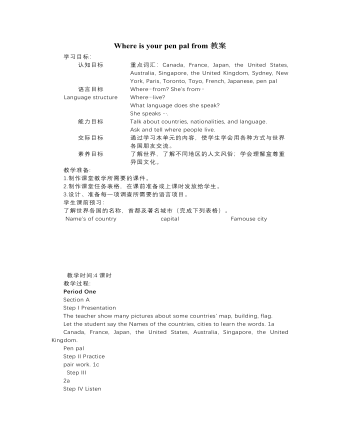
人教版新目标初中英语七年级下册Where is your pen pal from教案
2.1Match the country with the language.Step II Reading3a? let the students read the letter fast and answer the questions.? Let the students ask more questions about the letter as possible as the can.Step III Writing3b.Step IV. Pairwork2cStep V Listening2a, 2bStep V. HomeworkExercises book(1) P3Exercises book (2) P3Period FourStep I . Dictate the words and sentences in Unit1.Step II. Self-checkStep III. Check the answers for Exercises book in the unit.Step IV. Home workRevise and preparation for unit 2.教学反思:通过本单元的学习,学生基本可以谈论人们的国籍,居住城市及其所说的语言,通过书信方式去介绍自己并寻找笔友。但在涉及到国外的一些城市时,学生对这方面的知识相对欠缺,能介绍的城市并不多,也反应出学生课前预习不充分,这跟学生学习条件也有关,大多数学生无法通过网络获取所需信息。因此,在以后的教学中要多指导学生通过计算机网络获取信息,拓宽知识面。
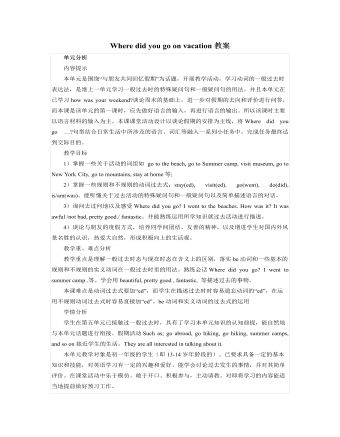
人教版新目标初中英语七年级下册Where did you go on vacation教案
句型: Where did you go on vacation? I went to summer camp.Did she go to Central Park?Yes,she did.No, she didn’t语法:一般过去时特殊疑问句、一般疑问句及肯、否定回答。课时安排4课时第一课时:Section A:la,1b,lc,2a,2b,2c 第二课时:Section A:3a,3b,4第三课时:Section B:1,2a,2b,2c第四课时:Section B:3a,3b,3c,4 and Self Check第一课时教学目标掌握描写假期生活的形容词。假期里自己所做事情的简单表达。谈论假期做的事情及当时情况。谈论假期时旅游的天气,旅游者以及食物等。教学过程一、导入播放一首英文歌曲:Let’s travel 说明:通过让学生听节奏欢快迪斯尼英语歌曲Let’s travel.引入本节课谈论的话题vacation and travel. 让歌曲使学生的思维活跃,增强课堂气氛,激发学生提高学习英语的兴趣。T:How is the trip ?Ss : It’s pretty good/ happy/exciting /relaxing/busy/dangerous/ fantastic说明:这个问题是为了操练形容词。建议让多个Ss作答。鼓励他们用不同的形容词。上述个别形容词本应在第二课时中出现,但可以在warming-up中第一次非正式出现。这些形容词也可在老师的评价语中适时出现,以加深学生对词汇的印象。
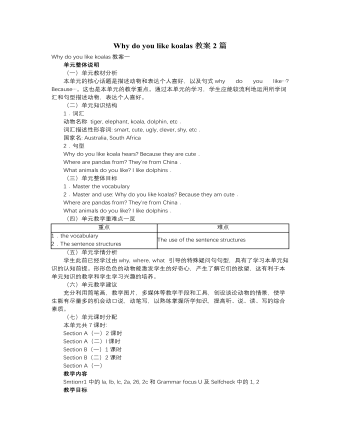
人教版新目标初中英语七年级下册Why do you like koalas教案2篇
单元整体说明(一)单元教材分析本单元的核心话题是描述动物和表达个人喜好,以及句式why do you like…? Because…。这也是本单元的教学重点。通过本单元的学习,学生应能较流利地运用所学词汇和句型描述动物,表达个人喜好。(二)单元知识结构1.词汇动物名称 tiger, elephant, koala, dolphin, etc.词汇描述性形容词: smart, cute, ugly, clever, shy, etc.国家名: Australia, South Africa2.句型Why do you like koala hears? Because they are cute.Where are pandas from? They're from China.What animals do you like? I like dolphins.(三)单元整体目标1.Master the vocabulary2.Master and use: Why do you like koalas? Because they am cute.Where are pandas from? They're from China.What animals do you like? I like dolphins.(四)单元教学重难点一览(五)单元学情分析学生此前已经学过由why, where, what 引导的特殊疑问句句型,具有了学习本单元知识的认知前提。形形色色的动物能激发学生的好奇心,产生了解它们的欲望,这有利于本单元知识的教学和学生学习兴趣的培养。
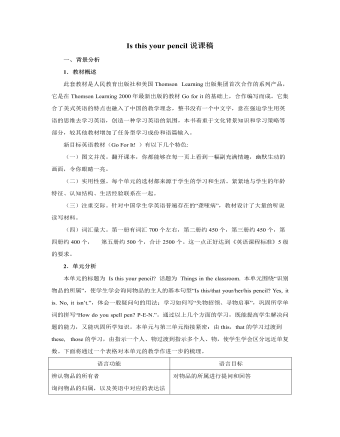
人教版新目标初中英语七年级上册Is this your pencil说课稿
教师准备利用录音使学生学习一些物品名词,并引导学生进行Pair work,学会询问“What’s this? It's a … . How do you spell watch? W-A-T-C-H.”;引导学生写“寻物启事”和“失物招领”,画图猜测物品,巩固所学内容,培养学生动脑、动手的能力及拾金不昧的精神和助人为乐、团结友爱的品德。学生准备学习一些物品名词,了解写寻物启事和失物招领的内容和格式。1. Warming up考虑到大多数学生以前学过一部分单词,可以以猜谜语竞赛的形式导出本课内容. 以pencil为例:Step1: 说出谜面, 可以用汉语解释.Our little JohnHas a wooden shirt on, And a long, sharp nose.He leaves his mark wherever he goes.接着教师画一件物品如:baseball 问学生:What’s this? 让学生使用句型 Is this a/an…?进行猜测。2. Group work学生分成四人或六人小组,将本单元的单词画出来加以猜测并评出最佳图画和最佳猜词者。3. Read ,circle and write1) Ask students to look back at page 10 . Have students read the list of the words . 2) Look at the Section B 3a . 3) Check the answers by having one student read his or her circled answers . Answers : computer game , ring , ID card , watch 4) Page 11 3b . this activity provide guided reading practice using the target language . Teacher told students that they are in the wrong order . when they are in the right order , they will make a clear message .
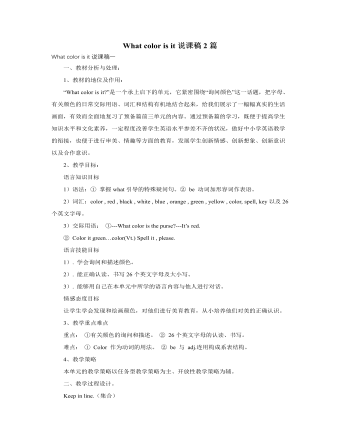
人教版新目标初中英语七年级上册What color is it说课稿2篇
该活动是为了加深学生对字母顺序的记忆。并在此同时学唱字母歌。要求活动前准备好火车头图案一个及字母歌磁带。在学生唱字母歌的同时,教师播放磁带。Arrive at the palace.( 进宫)到站了,字母客人经过一条由三张课桌垒成的地道后,来到一块写有“请过字母认读关”的牌前,一名交通警(由教师或学生扮演)出示字母卡片,让其逐个认读1—3个字母。凡认读过了关的到指定地点排好队。不能正确认读的经指导认读正确后去指定地点,准备上宾馆。该活动旨在训练字母的认读和发音。要求事先准备一块 “请过字母认读关”的标牌。Go to ABC Hotel. (上宾馆)已进城上宾馆的客人须在ABC Hotel(字母宾馆)内按编号拿取房门钥匙方可入内。这时带头饰大写A卡者拿取小写a卡,带头饰大写B卡者拿取小写b卡,其他人均寻找并取走相应的小写字母卡。
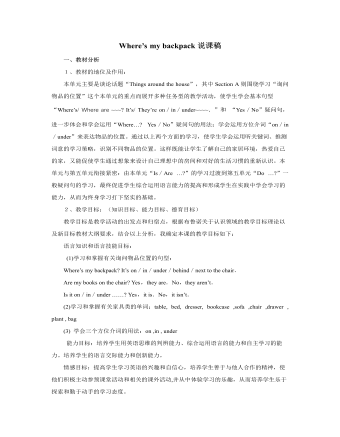
人教版新目标初中英语七年级上册Where’s my backpack说课稿
语言知识:Where is/are-----? Is it /Are they on/in/under-----? Yes, it is. / No, it isn’t.Yes, they are./ No, they aren’t.任务二:寻宝大行动活动目的:通过创设贴近生活的语言情景,学生自由选择所学的语言知识进行交流,培养学生综合运用语言的能力。活动过程:学生课前把自己最喜欢的一件东西收藏起来。以小组为单位,询问其他组员把宝物放在什么地方。规定时间内找到宝物最多者获胜。语言知识:Where is/are-----? Is it /Are they on/in/under-----? Yes, it is. / No, it isn’t.Yes, they are./ No, they aren’t.任务三:找差别活动目的:培养学生用英语思维的判辨能力,并对学生渗透德育教育:应该养成良好的生活习惯,保持房间干净整洁。活动过程:学生看两幅相似的图片,图片中有一些相同的物品,但所放的地点却不一样。以小组为单位,轮流询问有关物品所在的位置。学生记录下两幅图片中物品位置的不同,并在班上汇报自己小组得出的结果。
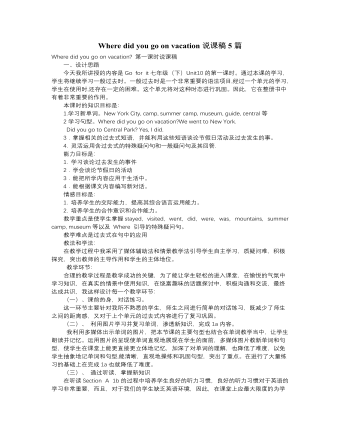
人教版新目标初中英语七年级下册Where did you go on vacation说课稿5篇
三、说教法只有当教师既在思想上把学生当成真正的学习主体,又在课堂教学过程中始终把学生当做学习的主人,教学目标才能实现,教学效率和效益才可能提高。因此课堂上加强对学生学习策略的指导是非常重要的,要使课堂教学过程成为师生共同参与,相互作用与反馈,创造性地实现教学目标的过程。另外,结合本节课内容特点,我还确立了“任务型”教学模式,并配合情景教学来实现教学目标。四、说学法课程标准倡导:教学要着眼于学生的全面成长,促进学生认知、情感、态度与技能等方面的和谐发展,着眼于学生潜能的唤醒,开掘与提升,促进学生的自主发展;关注学生的生活世界和学生的独特需要的有机结合,促进学生有个性,有特色的发展,关注学生的终身学习的愿望和能力的形成,促进学生特性发展。因此我确定本节课学习策略是:1、积极调动学生参与的积极性,指导学生感知,体验参与和合作。2、通过阅读,获取信息,并能回答相关问题。3、善于发现总结或把知识归类,按一定语言规律加以运用。

人教版新目标初中英语八年级上册Can you come to my party教案3篇
Step 3 (3b)First, tell the students when we talk about our future plans, we often use: I’m+verb+ing When we talk about what we must do, we use have to. Ask the students to fill in the blanks in 3b. The answers are: shopping, go to see, a test, I’m going, my family. Step 4 (3c)Let the students write an e-mail message to a friend. Say why you can’t visit next. Before the exercise, ask the students to give some possible answers and write them on the blackboard. So the students will feel easy to finish the writing exercise. After they finish it, Let them to correct it in groups first. Each group chooses theirs best one to read in front of the whole class. Step 5 ( planning a party )First read the conversation in the box together. Then ask the students to turn to page 88.Write down everything you have to do next week. Write in all the things you have to do . Ask the students to look at the list. Ask them “What day are you free?” This is when you can have your party. Step 6 (Self check 1 )Let the students to fill in the blanks with the words given. Change the forms of the words if possible. Then make their own sentences. The answers are: visit, playing, have to, study, comeStep 7 (Self check 2)Imagine you are Marie. Read the information and look at your schedule. Write replies to the invitation.
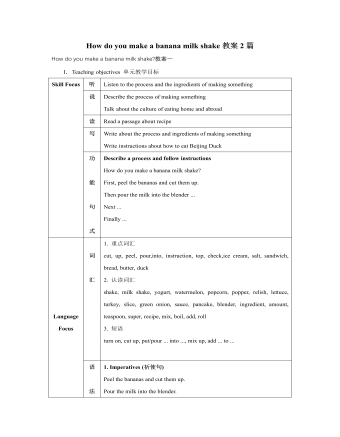
人教版新目标初中英语八年级上册How do you make a banana milk shake教案2篇
1. First, ... then, ... next, ... finally, ...首先,……然后,……接着,……最后,……这是英语中表达做某事的步骤的一种说法。如果步骤较多,还可以说:first-next-after that-later on-finally/at last通常你会听到说英语国家的人在说 first, next, then, finally 和后面的内容时,他们会做一些停顿。这样就能提前告诉听者接下来讲的是一系列的步骤。这一点在朗读和听力中应特别注意。2. how many, how much均为疑问词,同是“多少”,但用法不同。请看:how many修饰可数名词复数,how much修饰不可数名词。但在用法上,同学们常犯如下错误:1) [误] How many are there bananas on the table?[正] How many bananas are there on the table?[析] how many, how much 中的many,much是形容词,常修饰名词作定语,故后面跟名词。2) [误]How much tea are there on the table?[正]How much tea is there on the table?[析] how much修饰不可数名词时,谓语动词用单数。how many与how much的区别可简记为:前how many:问“多少”,复数名词后面跑;how much问“多少”,不可数名词单数好。前者答语用基数词,后者答语用数量关系。
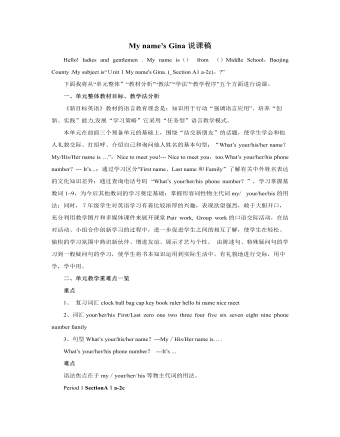
人教版新目标初中英语七年级上册My name’s Gina说课稿
1、利用插图或实物卡片让学生找出在预备篇中所学的单词,然后教师引导学习打招呼和介绍自己、询问他人姓名的基本句型。2、让学生听1a、1b对话,练习对话并模仿对话,结识班级的其他同学Step4 Practice师生互动(角色扮演) 让学生进行角色扮演1c、2c的对话,每两人一组,编对话,这个步骤主要是对1a-2b的内容进行巩固。Step5 听说活动(句型操练)1.播放2a部分的录音让学生听,引导学生通过听对话熟悉人名,完成2a,2b部分的教学任务。2.引导学生重复他们所听到的,模仿对话结识班级的其他同学,完成2c部分的教学任务。3.概括语法点Step6 知识拓展 引导学生阅读3a图中的名和姓,了解有关中外姓名的文化知识差异;从3a中给自己选一个姓、名,然后调查其他同学的姓、名,完成3b的任务。Step7 Conclusion复习本课重难点,巩固知识。Step8 Homework让学生在课后运用所学单词句型进行对话 练习。
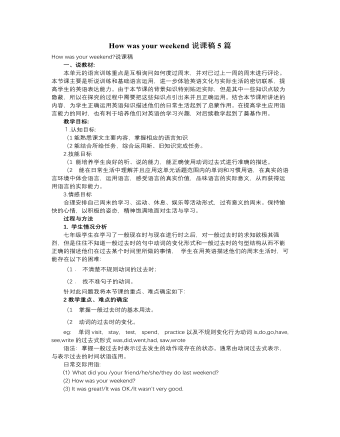
人教版新目标初中英语七年级下册How was your weekend说课稿5篇
(一)说教材与教情从本单元的题目How was your weekend?就可以知道本单元的语言目标是讨论曾经的活动或过去发生的事件,要求学生掌握的语法知识就是一般过去时。一般过去时这一时态在Go for it!这套书里这是第一次出现,因此要让学生把一贯以来他们所熟悉的一般现在时暂时搁浅,而用新学的一般过去时来表述发生的事件,无非是本单元的重点也是本单元的难点所在。要攻克这一重难点的关键,我认为在于能使学生对动词的过去时具备一定的熟巧度,并且这种熟巧度不仅应该表现在听说能力上,也应该体现在阅读和写作能力当中;不仅要在听和读的语言输入过程当中能够对这一时态有较强的敏感度,也要在说和写的语言输出过程中能够比较自然和自如地运用这一时态。对一般过去时在语言中运用的这种熟巧度实际上也就是本单元预期达到的语言技能目标。在本单元整体的知识和技能的大目标下,本课时作为本单元的第三课时,也就是本单元最后一个课时,它所覆盖的课本内容是Section B中的听力、阅读和写作。
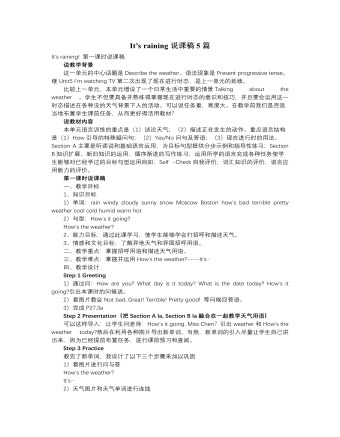
人教版新目标初中英语七年级下册It’s raining说课稿5篇
学会谈论天气情况的好坏 A B C DHow引导的特殊疑问句的用法 A B C D综合评估 A B C DA. 很好 B.较好 C.一般 D.需努力姓名 学号 评估项目及内容 评估情况单词和词组学习和运用情况 A B C D语法掌握情况——现在进行时用法及构成 A B C D学会介绍天气情况,描述天气 A B C D学会谈论天气情况的好坏 A B C DHow引导的特殊疑问句的用法 A B C D综合评估 A B C DA. 很好 B.较好 C.一般 D.需努力附表(三)学生自我检查评价表Unit6日期:姓名 班级 学号 自 我 检 查 评 价1、我会读、能听懂下列的单词和词组: 1、我还不会读、不能听懂下列的单词和词组:2、我已掌握了下列的单词、词组(习惯用语) 2、我暂时未掌握下列的单词、词组(习惯用语)和句型3、能在实际情景中运用上述的单词、词组(习惯用语)和句型 3、未能在实际情景中运用上述的单词、词组(习惯用语)和句型我准备来改善提高我的学习效率。初中七年级(下)新目标(英语)单元检测题一、听力(Listening Test)满分为20分

